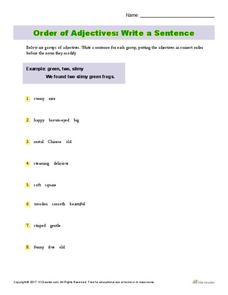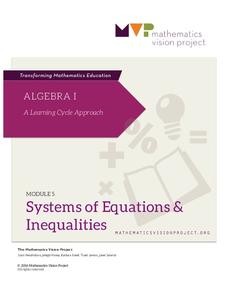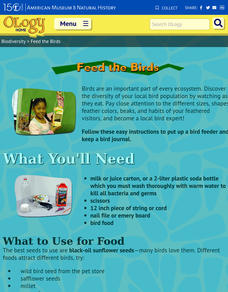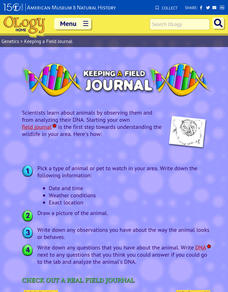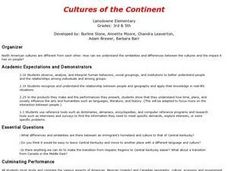K12 Reader
Order of Adjectives: Write a Sentence
Knowing the parts of speech can make you a better writer! Young grammarians use sets of two and three adjectives to write engaging sentences, taking care to use the adjectives in the correct order.
American Psychological Association
Psychology Goes to Madison Avenue
As part of a study of well-known psychologists, class members create a name, a business logo, an advertisement for TV, online, radio, or print, and a pamphlet for the business run by one of the psychologists on a provided list. An...
Kenan Fellows
An Analytical Chemist, a Biochemist, an Animal Scientist, and an Oncologist Walk into a Lab...No Joke
Oncology presents multiple opportunities for research and the collaboration of many different types of scientists. Scholars divide into groups and research the history of mass spectrometry, polarity/non-polarity,...
Mathematics Vision Project
Module 5: Systems of Equations and Inequalities
Systems of equations and inequalities model contextual situations. A set of 12 lessons build a solid understanding of writing and solving systems of equations and inequalities using a variety of methods. The module is the fifth in a...
Kenan Fellows
Unit 4: The Brain
Drugs interact with the brain to alter moods, emotions, and behaviors by changing the brain's chemistry, perceptions, and interactions. The final lesson in the Pharmacology unit shows scholars experiments, has them complete four labs,...
Reed Novel Studies
The Summer of Riley: Novel Study
The Labrador retriever is America's most popular dog breed. With the novel study for The Summer of Riley by Eve Bunting, scholars learn more about the sweet, lovable animal. Additionally, they write quatrain poems, explore foreshadowing...
Poetry4kids
Alliteration and Assonance Lesson Plan
Scholars analyze the poem My Puppy Punched Me in the Eye by Ken Nesbitt in order to locate examples of alliteration and assonance. After reading the poem, alliterative words are underlined and assonant words are circled.
Poetry4kids
How to Write Funny Poetry — Chapter 3: Choosing a Topic
Nothing's better than a really funny poem! Help young writers craft their funny poems with a lesson on one of the most challenging parts of writing: picking what to write about.
Poetry4kids
How to Write a Clerihew
Writing funny poems is the best part about learning poetic forms! Young poets learn all about clerihews—humorous four-line poems about people—with an explanatory lesson.
ReadWriteThink
Webcams in the Classroom: Animal Inquiry and Observation
Boost observational skills with an inquiry-based lesson that takes scholars on a virtual field trip. With help from webcams, learners observe animals in a zoo or aquarium. Observations go into a journal and a discussion is held to review...
American Museum of Natural History
Feed the Birds
What kinds of birds are common in the area? Young scientists use household supplies to create bird feeders. They then document the birds that come to their feeders by keeping journals.
American Museum of Natural History
Keeping a Field Journal
Recording scientific evidence allows for important discoveries and conclusions. A remote learning resource outlines how to create a field journal to record scientific observations. The outline resource includes notation about the...
J. Paul Getty Trust
Expressing Emotions through Art Lesson 1—Everyone Shows They Care
In a instructional activity that explores art and emotions, scholars analyze a piece of art and discuss which emotions it portrays. They go on to reflect on their own emotions and how they are similar to the feelings expressed...
American Museum of Natural History
Keeping a Field Journal
Young scientists begin a field journal by following four steps. A real-world example of an entry showcases the different parts, including location, date, drawings, and more.
American Museum of Natural History
Feed the Birds
Scholars use a large carton, string, an emery board, and bird food to create a hand-made bird feeder. After completing the craft, pupils keep a journal to track their observations.
PBS
Robot Body Language
Don't be so emotional! Scholars take part in an activity where they consider how future robots will be able to show emotions. They place paper bags over their heads, act out emotions through body movements, and have others guess the...
Curated OER
Animal Homes
Students explore how an animal's relationship to its habitat affect the animal's survival. They discuss animal habitats and the animal's relationship to that habitat through the food chain, life cycle, community, and balance of nature....
Curated OER
Cultures of the Continent
Students explore the various cultures of North America. They examine the differences and similarities between an immigrant's homeland and the culture of Central Kentucky. Students discuss strategies to make the transition easier for...
Curated OER
Cultural Characteristics
Students are introduced to the various types of cultures found in the world. Using the internet, they research a culture they are interested in and answer comprehension questions. In groups, they demonstrate in a PowerPoint presentation...
Curated OER
Creature Features
Students examine why certain animals live in only specific places throughout the world. Using animals, they classify them based on their characteristics and identify their basic needs. They also observe and compare the life cycles of...
Curated OER
Dancin' to the Times
Fifth graders work in groups in order to research a specific music era or dance style to share with the class. They have studied different music styles that are included in the lesson and now they have the choice to research one. There...
Curated OER
Around the World
Students explore ways people from around the world are like them. They discuss how geography affects the way people live and work and how culture affects a person's day to day life. Students give a presentation over a chosen country to...
Curated OER
Citizen Me
Fifth graders examine what it means to be a citizen. Using the Constitution, they discover the functions and purpose of government. They compare and contrast the difference between a democracy and a monarchy. As a class, they discuss...
Curated OER
Author Study
Students examine and identify the characteristics of the different genres of literature. After being read and reading various stories, they identify how different books by the same author carry the same story elements. They discuss how...
Other popular searches
- Pet Care
- Pet Birds
- Pet Fish
- Pet Rabbits
- Pet Rats
- Pet Mice
- Kindergarten Pets
- Classroom Pets
- Taking Care of Pets
- Pets Animals
- Family Pets
- Our Pets


